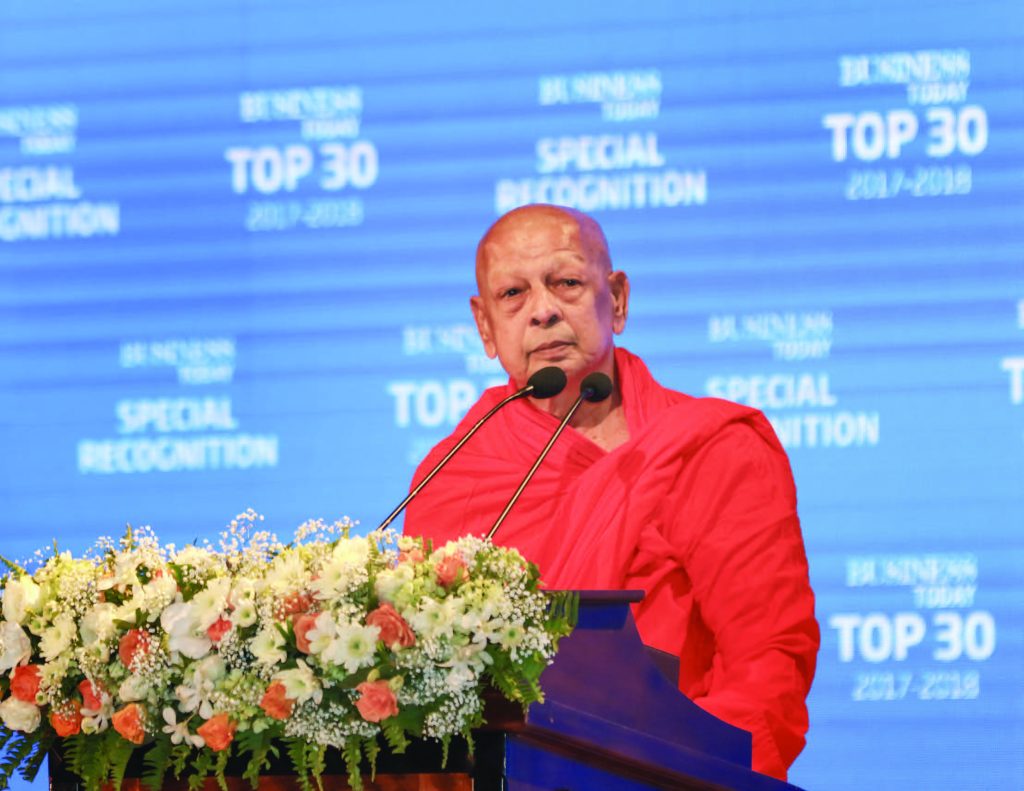
Venerable Galboda Gnanissara’s presence at the Business Today Corporate Awards was always highly valued.
The name Podi Hamuduruwo evokes a sense of fondness towards its bearer, and it was rightly so with Venerable Galboda Gnanissara, the former chief incumbent of the Gangaramaya Temple in Hunupitiya Colombo, who passed away in August. He was an embodiment of courage, kindness, and benevolence. For BT Options and Business Today, he was an ever-present friend, cheerleader, helper, and advisor. With an attitude of ‘never say never,’ Venerable Gnanissara spoke the language of religion and business with equal fluency and candor. He was a friend of the people, both great and small. He loved the underprivileged. He was a great proponent of Sri Lanka’s business community. He leaves a legacy of committed stewardship in harnessing the potential of Sri Lankans, youth, farmers, women, and entrepreneurs. Known for his effervescent personality, he was a man whose voice was heard on matters of national importance. But most of all, he was a humanist who treated everyone alike, a man to whom religion and ethnicity didn’t matter in making friends; his benevolence knew no limits. Podi Hamuduruwo was, in his lifetime, a larger-than-life personality on the national stage.
Words Jennifer Paldano Goonewardane.
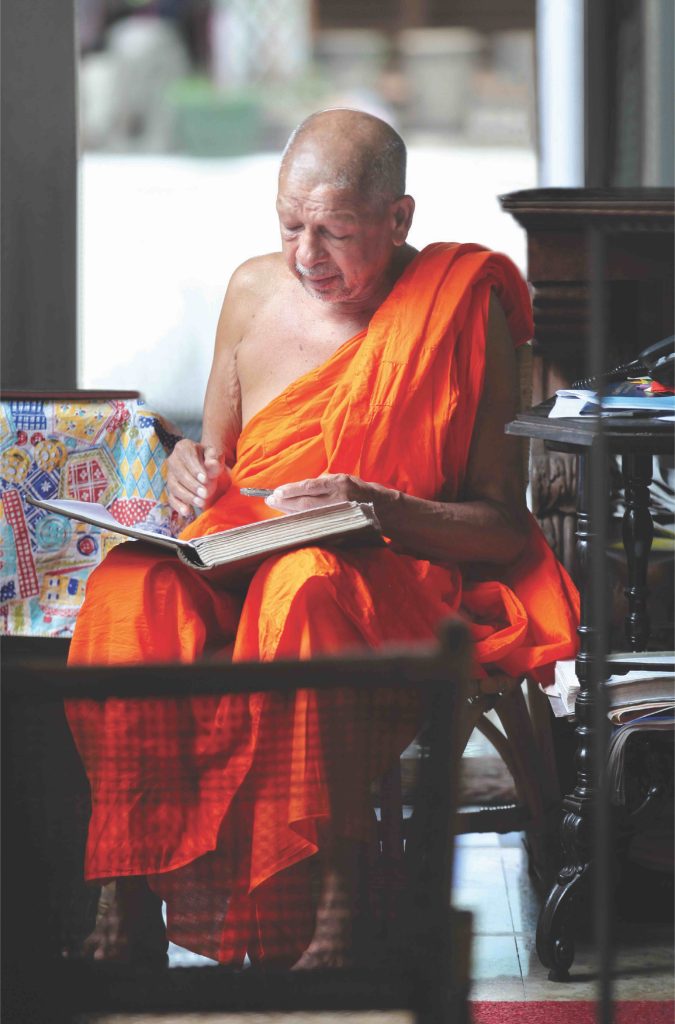
Gangaramaya Temple was his home from the age of 11 and he embodied immense kindness, boundless generosity, and unwavering passion.
He was fondly known as Podi Hamudurowo, but he was no small man. It was as if everything was possible with him. His voice and personality were mainstream for a very long time. He was popular and famous at the same time. He was not the typical temple-bound monk but a clergyman out and about, determined to impact society in his lifetime. Gung-ho and radiant, Podi Hamuduruwo was a force to reckon with who filled the room with his immense personality.
BT Options has a special place for Venerable Galboda Gnanissara. It’s a story of how a friendship began in 1989 when our paths crossed out of necessity. As the creator of the Navam Maha Perahera of the Gangaramaya Temple, Podi Hamuduruwo, like all his undertakings, ensured that it rose to prominence, investing in making it a grand affair in Colombo. What began in 1979, in less than ten years, the Navam Perahera had become a cultural cavalcade that drew large crowds. The savvy mastermind in him sensed the opportunity for the tourism industry and placed the first advertisement for the perahera in Explore Sri Lanka magazine in January 1989. However, the monk had to cap some backlash for commercializing a religious event from a newspaper editor, putting him in a spot.
Explore Sri Lanka stepped in, undertaking to promote the Gangaramaya Temple and the annual Navam Perahera without a charge. Since then, other publications of BT Options has promoted the annual Navam Maha Perahera and featured the Temple and Podi Hamuduruwo right throughout the year. It was an undertaking that BT Options continued faithfully until the end of the monk’s life.
The venerable monk was always grateful for the favor. Thus began an enduring friendship of mutual love and care between Podi Hamuduruwo and BT Options. This relationship grew stronger, where reciprocity sustained and nurtured it. A defining characteristic of his personality was that if he loved someone, he gave his all, and thus, it was with BT Options that he would go the extra mile to support our endeavors while the company was still growing. It was a warm relationship of mutual trust and respect. The monk was grateful for helping him elevate the temple’s visibility and transform it into a must-visit place for tourists. But Podi Hamuduruwo was the pivotal figure of Gangaramaya, who etched an identity for his beloved temple, elevating it to a status of preeminence that foreign dignitaries and leaders chose the temple to seek blessings. The temple is a testament to the monk’s grand vision, transforming a once quaint Gangaramaya surrounded by the Beira Lake and devoid of ostentatious bearings into the spectacular temple with dramatic edifices representing the diverse aesthetics of the Southeast Asian Buddhist cultures. He boldly introduced those changes as if he knew what to offer worshippers and visitors. Everyone appreciated those changes because they provided a window to the outside world. Looking back, we can say that no one could do it like Podi Hamuduruwo, and no one else after him could embrace the same enigmatic personality that he radiated.
The once quaint Gangaramaya, under Podi Hamuduruwo’s stewardship, expanded, not only in size but in its interior decor, adorned with a myriad of images of various sizes, forms, and materials like no other temple would. Most Sri Lankan temples are conservative in their manifest representations of Buddhism, but it was not so with Podi Hamuduruwo. One would rarely find a modern museum in a temple. Still, Podi Hamuduruwo managed to do that as well, establishing an excellent place for the extensive collection of objects in his possession, which include objects that represent the diversity of the Buddhist world and its aesthetic representation of the Buddha, while valuable gifts, personal collections, rare objects, and donations are on display with a vintage car collection that reflects the monk’s penchant for then which the visitors lap up with pleasure.
He was one of the happiest when the Business Today TOP Ten Awards were launched in 1996. His devoted presence and speech at the annual business awards were his way of expressing support for the program. At the request of Podi Hamuduruwo, the awards grew from ten to twenty-five to thirty and ultimately forty to recognize the corporate sector. The Venerable Thera had his spot on the agenda at each awards ceremony. He was our special guest whose friendliness permeated an audience of corporate bigwigs and political leaders. He accepted our invitation graciously every year until his ill-health stopped him. At other times, he enjoyed sitting with the staff of BT Options to tell his clerical journey and how he, as a child of eleven, had been ordained as a junior monk in 1954. He has spoken of the good and bad times he endured as a child but always reminisced about them with mirth. His guru was Venerable Devundara Vachissara, who would, in a few years, turn to his sixteen-year- old pupil to run the administrative affairs of the temple as his sight failed him. As he grew in stature, duly taking care of the temple’s affairs for his superior, he continued to be Podi Hamuduruwo to everyone but a junior monk who thought outside the box.

The first Navam Perahera advertisement that appeared in January 1989 issue of Explore Sri Lanka
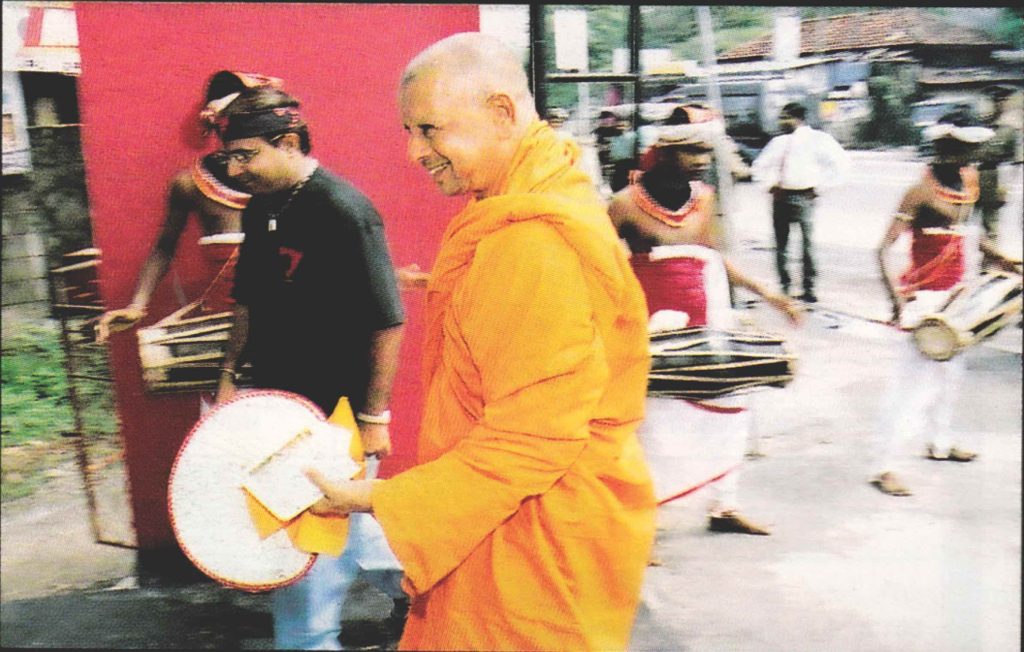
Podi Hamuduruwo with Mathi K Parthipan during the opening of MindHead in 2002, Sri Lanka’s first ever LAN Gaming Centre.
Podi Hamuduruwo was a man with big ideas who dreamed beyond the temple to impact society. In time, he became the face of competency, a man who walked the talk, a doer, a performer, and a deliverer. His entrepreneurial acumen catapulted him into prominence. Plucky, in every sense of the word, was a man on the move, using his immense platform to advocate for change. He had an enormous heart that felt for the poor and the underprivileged. The temple was a refuge for the needy, who were treated with food and provisions. He cared deeply for the people and the future of Sri Lanka, and living in the vicinity of communities that fell behind due to poverty, the monk took upon the cause of positive change. He witnessed young people dropping out of school owing to poverty and how they faded into obscurity as unemployed, some lured into substance abuse. The Jinarathana Vocational Training Centre was his response, and under his stewardship, it grew immensely, representing the bigger picture he envisioned for Sri Lanka. But fundamentally, it was a humane project aimed at harnessing the potential of young people from needy backgrounds, and he expanded it with passion as he witnessed his labor bear fruit in the young men who were given hope for the future.’
Podi Hamuduruwo brought his cheerfulness to the stage whenever he spoke at the Business Today awards. Best of all, he could relate to the ethos of the organizations. He admired entrepreneurship and celebrated their success.
Out of Colombo into the rural hinterlands, he expanded his community development programs; the Na Sevana project in Hambantota is one of the most significant projects with an extensive agenda for rural farming communities. It targets children and young people in and out of school, men and women. As a man close to people’s hearts, he knew the blow poverty deals on education, and many in rural areas drop out of school while young people cannot be gainfully employed due to lack of skills. The program helps children to remain in school with access to learning materials. Youth receive vocational training aimed at employment. The project works closely with farming families, empowering them with learning opportunities on technology and opening them to new livelihood opportunities and self-employment for women. Health and nutrition are also focus areas for children and adults alike, while spiritual enrichment to create a harmonious living environment in families, among family members, and in the community goes hand in hand with overall intervention. Podi Hamuduruwo was the visionary of the temple’s wide-ranging social interventions, and over the years, thousands have reaped the benefits of his community development initiatives. His desire was to instill best agriculture practices so that farmers would use water and technology efficiently, support women to start home-based income-generating projects, introduce fruits and vegetables with short harvesting times, facilitate the breeding and raising of livestock, and provide villagers with seeds, plants, and fertilizer. He established scholarship programs for young people who demonstrate growth potential but need more finances. The list of his initiatives goes on, from establishing a village for fifty families in Kataragama to acquiring derelict plantations and reviving them and helping their former beneficiaries to continue to live off those lands; his dynamic initiatives bore fruit in his lifetime.
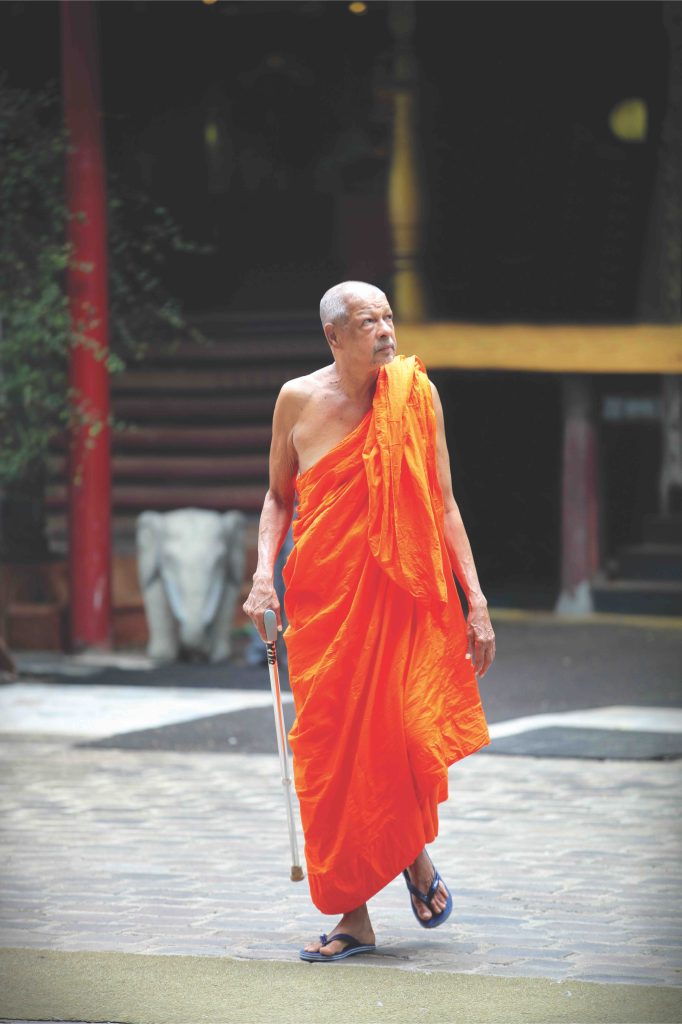
Podi Hamuduruwo was a larger-than-life personality known for his effervescent nature.
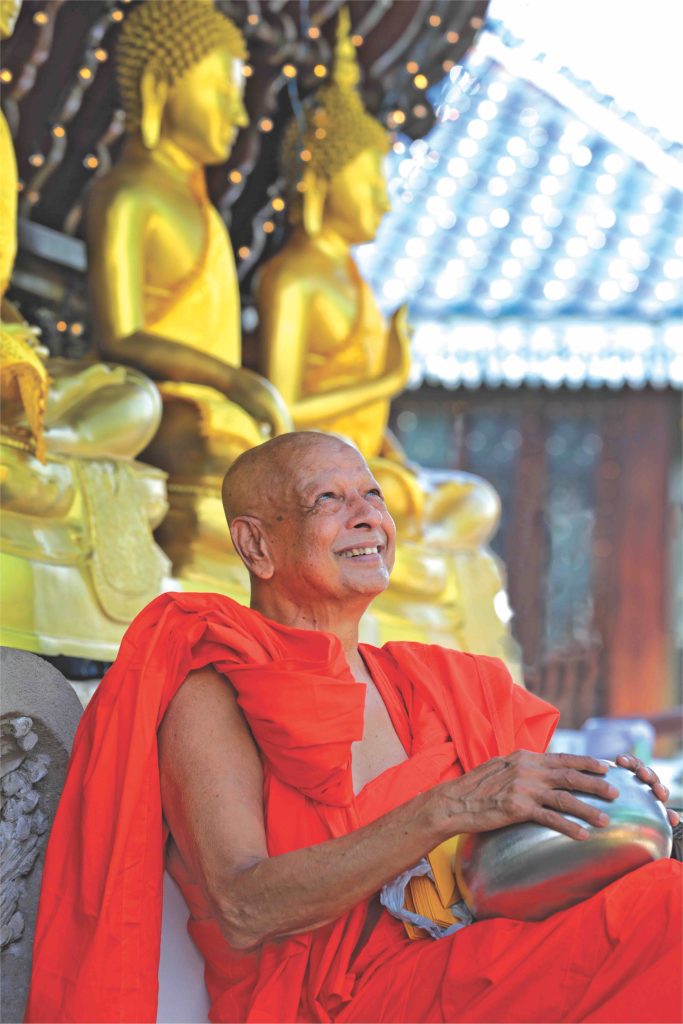
The monk who walked the talk also possessed affable.
Podi Hamuduruwo brought his cheerfulness to the stage whenever he spoke at the Business Today awards. Best of all, he could relate to the ethos of the organizations. He admired entrepreneurship and celebrated their success. Importantly, it was an opportunity to remind the corporates of their enormous responsibility towards social development, of finding a balance between social and economic imperatives, leading to commercial success. On every occasion, he appealed for more outstanding commitment to society and the country, distributing profits for the greater good among the needy and investing in urgent interventions. He would draw upon our native heritage of sharing, the good old practice of serving others before serving ourselves, the selfless nature of the Sri Lankan people, which he hoped the corporates would emulate in their approach to social responsibility, that the rational role of profit generation must
not be detached from the realities of the human plane, qualities that one expects from a people whose lives are deeply entrenched in religion and rooted in spirituality.
He felt for the rural poor and once appealed on the Business Today awards platform for needy school children in remote Hambantota villages for whom bicycles would ensure continued schooling. The corporates responded generously, providing three thousand bicycles fitted with luggage racks. Venerable Gnanissara was a country loyalist who stood firm in his beliefs, even if it meant raising his voice. But he was a gentle human being at heart. He would appeal to the business community and counsel them on good practices and governance, urging them to make the best use of their resources to meet the needs of society. And so, he spoke on behalf of his country, making the awards forum to drive facts to an influential group in society. His message was consistent – do good, he reminded, often evoking Buddha’s teachings.
He frequently spoke of happiness as the ultimate wealth, as preached by the Buddha, referring to it as the source of growth and prosperity, the ultimate attainment for a human being. Business leaders, he said, had a huge advantage in making people happy, creating a content workforce by treating people with compassion, paying fair wages, providing their needs, and ensuring their health. Something extraordinary about Podi Hamuduruwo was his immense ability to stand with anyone, anyone deemed big or small by society’s standards, and so he stood on the side of business owners as much as with employees, cheering them both and highlighting the immense role they can play in spurring growth. While people may opt to do many things in their quest for happiness, Podi Hamudurwo would say that sharing one’s wealth with the needy was the best way to happiness.
The common refrain in all his speeches highlighted the responsibility of businesses towards society and the country. As a passionate advocate for social development through human empowerment, he constantly urged businesses to do the same, to seek remote villages and impoverished communities to implement community development and infrastructure projects. Businesses as catalysts for growth, he explained its benefits to communities and the country when profits are shared, spurring a trickle down to individuals and communities outside the organization to impinge on growth, such as creating jobs and employment opportunities that will positively impact the country’s progress.
He was a true son of the soil, who, even in celebrating the war’s ending, did not celebrate the loss of lives or speak harshly of any community or religion. He was a unifier, ready to sit at the table with anyone. To him, the war ending meant that the country could carve a new path to development, where businesses could reap the benefits of freedom and be a catalyst for prosperity. However, he regarded poverty as an obstacle to reaping the benefits of freedom. He hence would urge businesses to be partakers in eradicating poverty in the country, as a fillip to government efforts for the same, ensuring that poverty and the inequality it creates doesn’t lead to another conflict in the future. Thus, he was a strong proponent of private sector participation in rebuilding the country, acknowledging the potency of the private sector to drive change in many areas.
Possessed with knowledge and discipline, Podi Hamuduruwo considered the private sector capable of investing in infrastructure, supporting local initiatives, youth, and startups, participating in social causes, and positively impacting social wellbeing. The Venerable Thera was a well-known advocate for youth empowerment and encouraged the private sector, given its knowledge and skill, to assist in youth mentoring and empowerment. The Thera called for collective engagement in providing opportunities to young people and the marginalized to awaken the economy.
His message was straightforward – share your profits and wealth with needy people. He opposed profit over humanity. He would say that the responsibility of making Sri Lanka prosperous was not solely with its elected leaders and that the business community was equal partakers. Race and religious politics, the monk would say, were detrimental to Sri Lanka’s future.
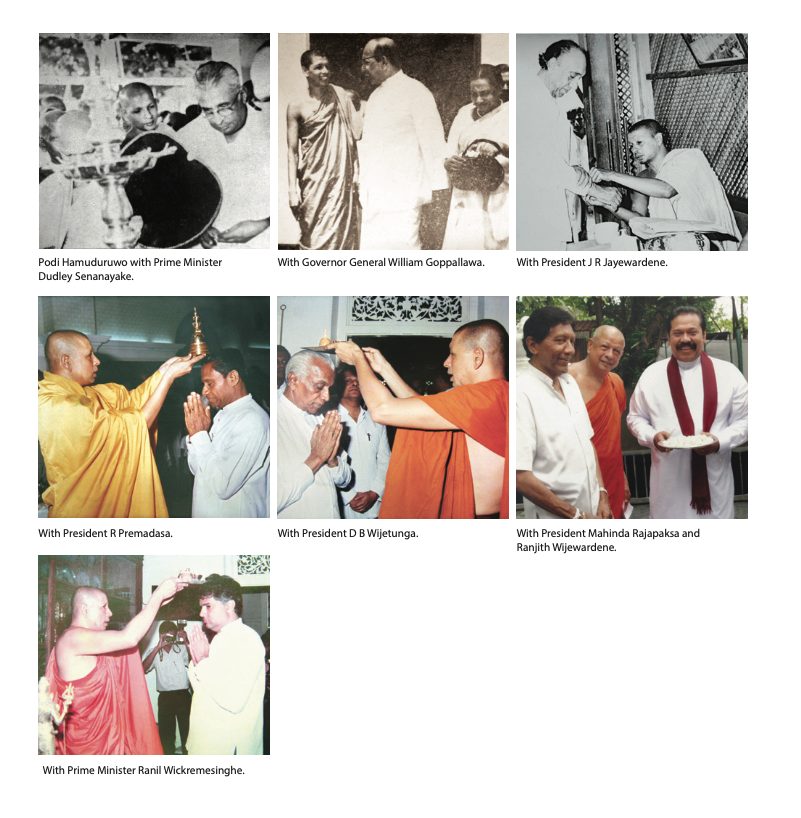


His message was straightforward – share your profits and wealth with needy people. He opposed profit over humanity. He would say that the responsibility of making Sri Lanka prosperous was not solely with its elected leaders and that the business community was equal partakers. Race and religious politics, the monk would say, were detrimental to Sri Lanka’s future. At his final appearance at the Business Today awards in 2018, he once again spoke of rising above religious and racial differences to carve a new story for Sri Lanka, reiterating that the island must return to religious fundamentals as guiding principles while underscoring the importance of sustaining Sri Lanka’s history, literature, languages and culture to nurture a future generation imbued with the correct values. His powerful message at his final appearance on the Business Today awards stage resonates well with the times we are experiencing today. He said, “Do business while working towards the country’s benefit with goodwill. Do not work with the option of fleeing to another country in mind. We must protect our country and work in unity towards the safety of all her people.” When many saw hopelessness in the country, he became the hope and sowed its seeds wherever he went. His appeal to business leaders was to reignite the past ethos upon which the country prospered, a country of disciplined and composed people, to drive business prosperity parallel to reinstating age-old values that were the bedrock of the island’s culture. As for Podi Hamuduruwo, he was a true son of the soil in every sense, and he expended his energy and skill as a deliverer to better the lives of everyone who crossed his path. And he did just that with BT Options. While his memory endures, we will genuinely miss his energetic presence.
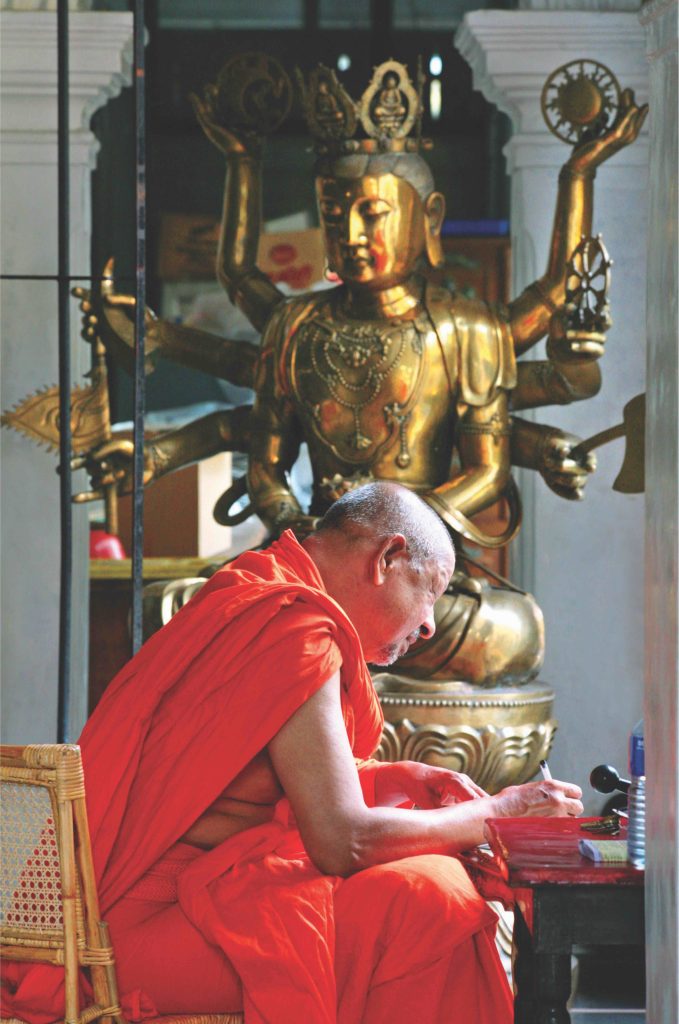
Podi Hamuduruwo during a few quiet moments at the Temple.
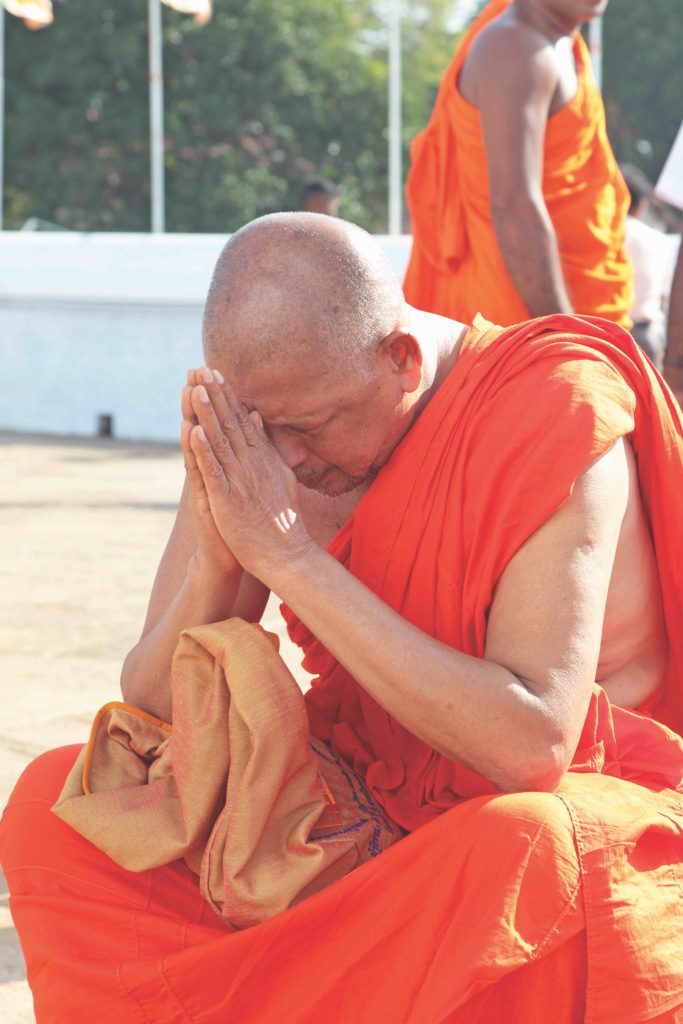
Podi Hamuduruwo in a moment of worship.





